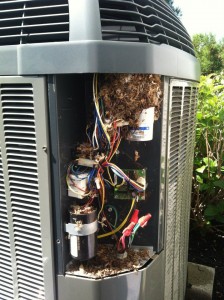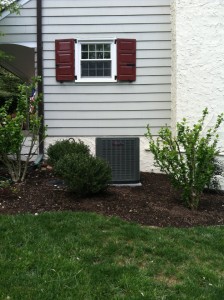Your Lansdale air conditioner can run virtually trouble free with just a little maintenance annually. If these little things like changing the air filter and cleaning the drain are not done regularly, the neglected units can really lose their cool.
The Basic Course
Through a process which involves the rapid evaporation and condensation of chemicals called refrigerants, air conditioners use compounds that have properties that allow them to change rapidly from gas to liquid and back again at low temperatures.
Heat is absorbed when the liquid evaporates and transforms into gas, making the space around it cooler. Compressing it tightly together again, the heated gas condenses back into liquid with a residue of unwanted moisture that must be released and is vented usually to the outdoors.
The newly cooled air is distributed through the house by means of ductwork, pushed by fans driven by electric motors. As the air moves along, it passes through a filter and can be further de-humidified.
Problems in the System
If the filter is clogged, movement of the cooled air is slowed to the point we might think the unit is broken. If the condensate drain is plugged, the motor can get damaged and stop producing. Regular maintenance performed by the home owner or as a service of Carney Plumbing, Heating & Cooling can avoid or eliminate these simple aggravations.
When the heat builds, however, and cool relief seems nowhere near the air ducts, it may be time to call a professional to dig deeper to find the reason and suggest solutions.
Back to Cool
If not serviced regularly, the amount of refrigerant in the coils may decrease over time or the coils themselves could get clogged and impede the evaporation/condensation process. A leak in the coils could drain the system, rendering the unit useless and wholly unproductive.
There are belts on each of the two separate fan motors which may be worn or loose, causing the fans to blow less efficiently. The motor may need to be oiled or have a broken part that doesn’t allow it to push the air at all.
Most of the time, these fixes are relatively minor and do not threaten the life of the air conditioning unit. Schedule an annual inspection and service from a certified Lansdale HVAC company like Carney Plumbing, Heating & Cooling today!


 Be sure to schedule your spring
Be sure to schedule your spring  Get
Get